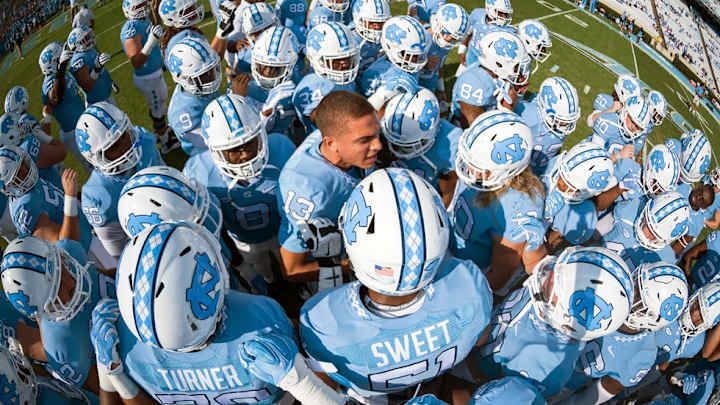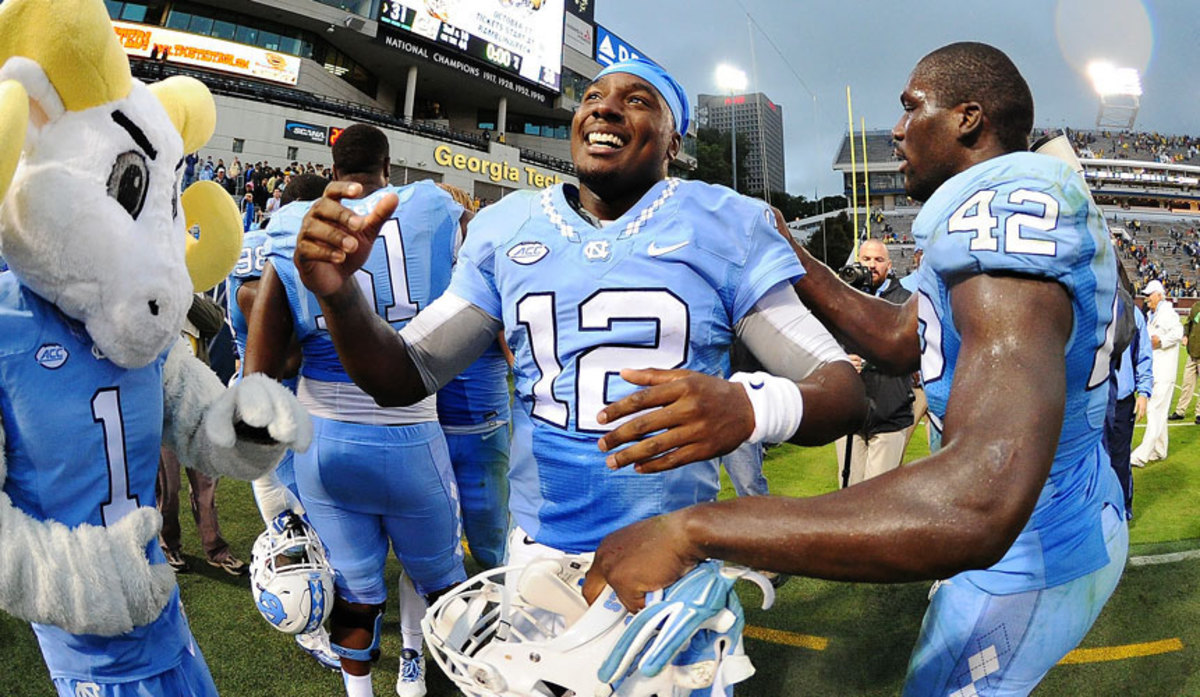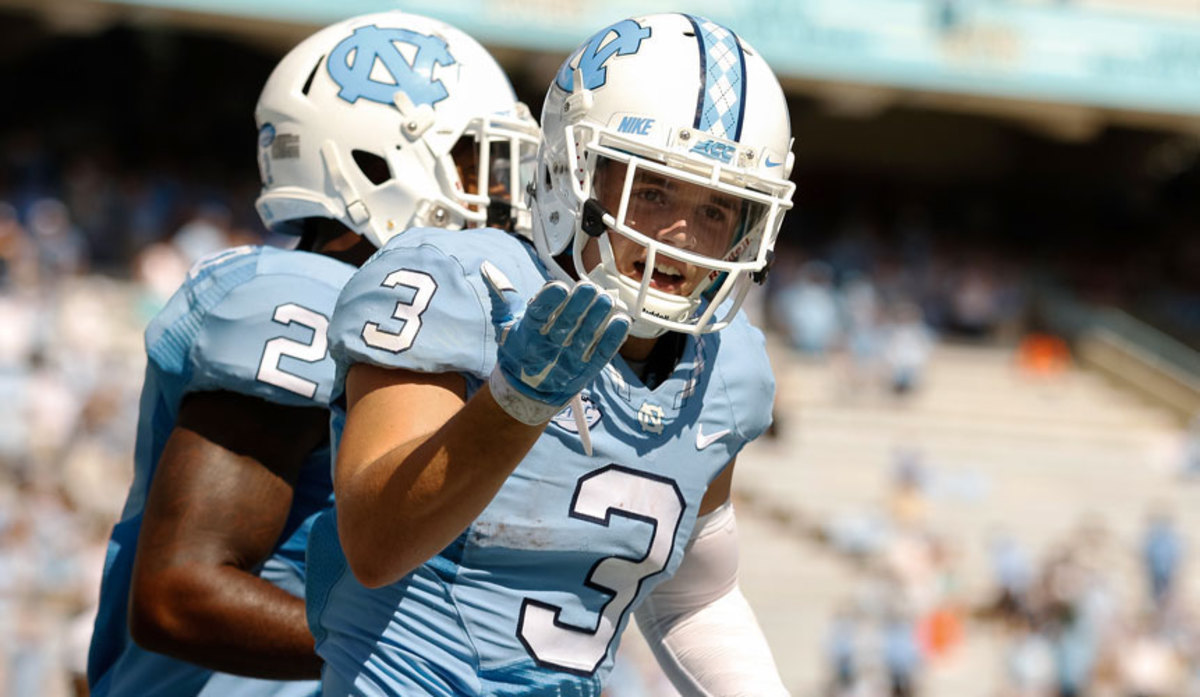Blue skies ahead? After dealing with dysfunction, North Carolina has the look of an ACC contender

CHAPEL HILL, N.C.—When things went bad over the previous two seasons at North Carolina, they often went cataclysmically bad. Each year featured a four-game losing streak by the middle of October, the sign of a team predisposed to sink like anvils at the first hint of adversity. Larry Fedora, the Tar Heels fourth-year coach, diagnosed this as a distinctly mental failing. So, for the 2015 preseason, he delved into his trove of psychological ploys and played his library card.
Each of North Carolina's seniors was assigned a chapter from The Positive Dog: A Story About the Power of Positivity, by author Jon Gordon. During training camp, the veterans presented individual reports discussing what they read and how it impacted the team. Landon Turner's material revolved around the cost of negativity, and how a small block of naysayers can infect an entire operation from the bottom up. After enduring three inconsistent years, the Tar Heels guard might have penned the chapter himself. "I just challenged the guys on the team not to be that five percent of people that are bringing the whole team down," Turner says. "If you get negative or down about a game, it's got to be water under the bridge."
Excluding the heavy metal guitar riffs churning through the evening air at a recent practice, there was little agitation as North Carolina finished that day's work of resetting its program trajectory. The Tar Heels (7–1) have won seven games in a row and control their ACC Coastal Division fate. The defense, directed by new coordinator Gene Chizik, is a top-20 unit that has been remarkably consistent, especially by its recent standards. The offense, powered by the potent backfield duo of senior quarterback Marquise Williams and sophomore tailback Elijah Hood, is among the top 25 scoring outfits (36.9 points per game) in the country.
But the Tar Heels may be here—in a place many figure this enigmatic program should regularly be—mostly because their responses are predictable and measured. There are no more volcanic overreactions to anything. They remember how important it is to forget.

Scott Cunningham/Getty Images
As a showdown with 6–2 Duke approaches Saturday, it seems eons ago that this season began with a desultory 17–13 loss to South Carolina on Sept. 3, a defeat that looks more inexplicable by the week. In past seasons, if such a result weren't fatal, it would have sliced the Tar Heels just deeply enough to start the hemorrhaging. Instead, Fedora said the Sunday workout after the defeat to the Gamecocks looked the same as any of the seven others that have followed victories. Strangely, this was ideal. He didn't need emotional overcompensation. He needed a team he could see coming. "The more consistent we are, the better we'll be," Fedora says. "The year before, we didn't have it. We were up and down throughout the year and you never knew which team was going to show up.
"You get to where you start questioning everything you do, and you're dissecting every decision. What am I doing? What am I doing wrong? What do I need to do to help these kids? I just didn't do a very good job with them last year. But this group, I think, learned a lot of lessons from last year. And that's really paid off."
Some of the adversity had little to do with on-field performance. Four Tar Heels defensive players were suspended before the 2014 opener over a reported off-campus hazing incident that left a non-scholarship receiver with a concussion. Then the Wainstein Report dropped in October '14, detailing the extent of an academic fraud scandal that prompted the NCAA to charge the school with five Level I violations—reflective of "severe" misconduct—in June. Some of the adversity, meanwhile, was pure knife-twisting. East Carolina put up a billboard after its 70–41 demolition of the Tar Heels in September that read "#beneathwho" and "This is Aargh! State." That the season turned into a 6–7 mess could hardly be classified as shocking.
It did not take long this fall to affirm that this version of North Carolina was more equipped to bounce back from misfortune. In the locker room after the South Carolina loss—a game the Tar Heels led entering the fourth quarter—Ryan Switzer was fully prepared to mope. After two years of routine disappointment, the junior receiver and his teammates had added another letdown to the heap. Here we go again, he thought. "Personally, I wanted to kind of grieve a little bit and get pissed off," Switzer says. "I wanted to go home, I didn't want to talk to anybody, I didn't want to hear any rah-rah speeches."
He didn't get one, at least not exactly. Nor was he afforded time to pout. A group of veterans—most notably Turner, senior receiver Quinshad Davis and senior linebacker Jeff Schoettmer—commanded everyone's attention before Fedora or anyone on his staff said a word. Their message: This is not going to define our season. This is not going to happen again. There was no need to elaborate beyond that.
"I credit that for where we are today," Switzer says.
The blunt talk echoed back to January, when the Tar Heels staged a bloodletting upon their return from winter break. A 40–21 Quick Lane Bowl loss to Rutgers on Dec. 26, capping an underwhelming season, still lingered like a stubborn rash. (Williams told reporters after that game, "A lot of guys really don't care.") In a meeting back on campus, each player had a chance to offer an opinion on what went wrong in 2014. "We got 125 problems addressed," Switzer says. "It was aired out. And that's what needed to happen."
To say that this North Carolina team is agenda-free is not entirely accurate. It has an agenda, but one that's common to everyone. There are few, if any, discernible fractures on the roster. "The locker room changed more than anything," Turner says. "Last year there was animosity everywhere you looked, between coaches and players, offense and defense. It wasn't intentional. We tried to fight it. But it just wasn't clicking for us."
Nowhere is this newfound composure more evident than on a defense refashioned by Chizik, the former Iowa State and Auburn head coach back on the sideline after two seasons away. It is now a unit almost metronomic in its performance. The Tar Heels have the nation's No. 16 scoring defense, allowing 17 points per game. That is a jump of 100 spots since the end of last season, which saw that defense surrender a ghastly 39 points per outing. Only once has North Carolina surrendered 20 or more points this fall, in a 38–31 win over Georgia Tech on Oct. 3.
When there are problems, the reaction of the staff mirrors the personnel's as a whole. "They don't panic," Fedora says. "They're not going crazy on the kids. It's O.K., let's show them what's happening and let them adjust. It's not like it's been major scheme adjustments at halftime. It's more pointing out what's actually happening and making sure they're seeing it. When they see it, they make the adjustments, and they play."

Cal Sport Media via AP Images
The Georgia Tech game is Fedora's case in point. North Carolina trailed by 21 points with less than two minutes left in the first half and surrendered 211 rushing yards by intermission. "At halftime, it wasn't, oh god, we gotta go in there and change this and change that," Fedora says. "You're not going to be able to do that. You go in: 'Hey guys, these are the two or three things that are hurting us. You guys have to be able to handle that.' And they did." The Tar Heels gave up 51 rushing yards after the break, avoiding a schematic overhaul and cutting Georgia Tech's production by 75% en route to the largest comeback in program history.
Though a 26–19 victory over Pittsburgh two days before Halloween provided North Carolina with a spotlight win, its hardest work lies ahead. If not for the loss-that-shouldn't-have-been at Miami last weekend, Duke would be unscathed in ACC play. The Blue Devils pose a threat on Saturday. Then the Tar Heels will visit Virginia Tech in the final home game for retiring Hokies coach Frank Beamer on Nov. 21 before heading to play their regular-season finale at NC State on Nov. 28. If North Carolina has been a program of unrealized potential for too long, it will be have plenty of opportunity to change people's minds by the end of the month.
The direction is auspicious, at least. This team regulated its emotions after seeing how far immaturity got it, and the benefits of a consistent approach should resonate with the underclassmen as they move into more significant roles. "You have to have guys that have been through it," Switzer says. "You have to have guys who have seen the good, the bad and the ugly. And we've got guys that have seen all three phases of that. We've been at high highs and really low lows. I've seen us get 70 points put on us. I've seen us completely lay down, and a lot of guys have. That experience helps us a ton."
On the field long after a recent practice ended, after the heavy metal music was cut off and everything in this sector of campus was once again cool and still, Fedora noted to a visitor that the opener against South Carolina wasn't going to make or break his team's season. The goal, he said, was to win the ACC.
He's right and he's wrong, of course. Nothing about that disappointing first result damaged North Carolina's ability to seize the league. Seven games later it hums along on track for an appearance in the conference title game. But his team is likely better for absorbing a massive anticlimax, for rousing all those demons from seasons past, and forgetting about it all almost as quickly as it happened. Maybe that loss shaped everything to follow. Ask the Tar Heels, and they sound pretty positive about that.
